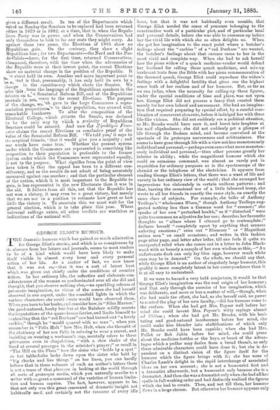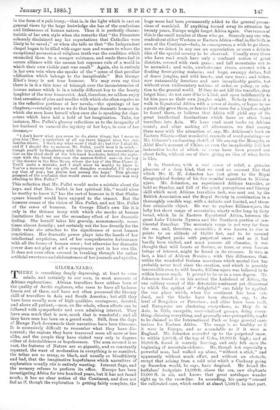T HE dramatic humour which has gained so much admiration for
George Eliot's stories, and which is so conspicuous by its absence from her letters and journals, seems to most readers
to be of a kind which would have been likely to make itself visible in almost every hour and every personal action of her life. As ' a matter of fact, we now know that it was not so,—that it was a sort of latent beat which was given out chiefly under the conditions of creative fiction. In her ordinary life, the reflective and elaborate considerateness of the woman so predominated over all she did and thought, that you observe nothing else,—no sparkling colours of prismatic imagination, no vision of the scenes she had herself observed in one aspect, under the manifold lights in which the various characters she could create would have observed them. When you turn to her books, and consider how, in" Silas Marner," the good-natured, husky butcher at the Rainbow mildly resents the imputations of the quarrelsome farrier, and limits himself to c =tending that the" red Durham" cow had turned.out "a lovely carkiss," though he "would quarrel with no man " ; when you remember in "Felix Holt" how Mrs. Holt, when she thought of the obstinacy of her son Felix in refusing to wear a cravat, and insisting on wearing a workman's cap, mentally refers to these grievances even in chapel-time, "with a slow shake of the ISsead at several passages in the minister's prayer;" or recall in "The Mill on the Floss" how the sister who "holds by a spot" ou her tablecloths looks down upon the sister who held by "big checks and live things" on her linen, you can hardly believe that in three volumes of such an author's letters there is not a trace of that pleasure in looking at the world through all sorts of grotesque media, which you naturally ascribe to a writer with so great a command of the varieties of human limitation and human caprice. The fact, however, appears to be, that not only was this great command of dramatic insight not habitually ussd, and certainly not the resource of every idle
hour, but that it was not habitually even useable, that George Eliot needed the sense of pressure belonging to the constructive work of a particular plot, and of particular local and personal details, before she was able to summon-up before her the vivid life with which she so often delights us. When she got her imagination to the exact point where a butcher's feelings about the " carkiss " of a "red Durham" are wanted, the butcher's feelings about that carcase came to her in the most vivid and complete way. When she had to ask herself how the pious widow of a quack medicine-vendor would defend her husband for selling those quack medicines, and mix-up irrelevant texts from the Bible with her pions commemoration of the deceased quack, George Eliot could reproduce the widow's feelings with a delightful fertility that gives one the highest sense both of her realism and of her humour. But, so far as we can judge, when the necessity for calling-up these figures, under the special conditions of time and place, was not upon. her, George Eliot did not possess a fancy that created them merely for her own behoof and amusement. She had an imagination that required preparing by special effort, by a careful combination of concurrent elements, before it indulged her with these life-like visions. She did not suddenly see a political situation, as Mr. Brooke would have seen it, and burst into laughter at his naïf slipshodness ; she did not suddenly get a glimpse of life through the Dodson mind, and become convulsed at the spectacle of its grotesque narrowness and arbitrariness. She seems to have gone through life with a view not less monotonously individual and personal,—perhaps even somewhat more monotonously individual and personal,—than other persons greatly her inferior in ability ; while the magnificent humour which she could on occasions command, was almost as rarely put in requisition for ordinary purposes as is the spectroscope of the chemist or the telephone of the electrician. It appears from reading George Eliot's letters, that there was a want of life and variety in her ordinary view of the world ; that she an-anged her impressions too elaborately in certain uniform patterns ; and that, barring the occasional use of a little laboured irony, she wrote to all her friends in exactly the same style, on exactly the same class of subjects. For example, she talks of Anthony Trollope's "wholesome Wesen," though Anthony Trollope suggested nothing less than a German word for " essence ;" she speaks of her own "perturbed health," as if " disturbed " were quite too common an adjective for her use; describes her favourite thoughts as "altars where I oftenest go to contemplate ;" declares herself "completely upset by anything that arouses unloving emotions ;" cries out " Ebenezer " or " Magnificat anima mea " on small occasions ; and writes in this fashion page after page, and letter after letter, till one feels it quite an unexpected relief when she comes out in a letter to John Blackwood with so homely a sample of her own wisdom as this,—" An unfortunate duck can only lay blue eggs, however much white ones may be in demand." On the whole, we should say that, while George Eliot is an author of singularly large humour, this quality is more completely latent in her correspondence than it is at all easy to understand.
If we were to hazard a very bold conjecture, it would be that George Eliot's imagination was the real origin of her humour ; and that only through the exercise of her imagination, which was deliberate, and more or less a matter of will,—though, when she had made the effort, she had, as she herself said, no power to control the play of her own faculty,—did her humour come to the surface. When she had got Mrs. Poyser well before her mind she could invent Mrs. Poyser's witty sayings almost ad libitum; when she had got Mr. Brooke, with his hesitating and good-natured incoherence before her mind, she could make him blunder into stultifications of which only Mr. Brooke could have been capable ; when she had Mrs. Pullet or Bob Jakin before her mind, she could prose about the medicine-bottles or the keys, or boast of the advantages which a pedlar may derive from a broad thumb, as only these admirable characters could have done it; but she is dependent on a distinct vision of the figure itself for the humour which the figure brings with it ; she has none of Charles Lamb's delight in the rapid interchange of associated ideas on her own account ; she is not a humourist first and a dramatist afterwards, but a humourist only because she is a dramatist. And then she was a dramatist only when she had all her spells in full working order and had distinctly realised the figures which she had to create. Then, and not till then, her humour flows in a large stream. But otherwise her husnOur appears only
in the form of a pale irony,—that is, in the light which is cast on general views by the large knowledge she has of the confusions and littlenesses of human nature. Thus it is perfectly characteristic of her own style when she remarks that "the Dissenters solemnly disclaimed any lax expectations that Catholics were likely to be saved ;" or when she tells us that "the Independent chapel began to be filled with eager men and women to whom the exceptional possession of religious truth was the condition which reconciled them to a meagre existence, and made them feel in secure alliance with the unseen but supreme rule of a world in which their own visible part was small." Again, She is entirely in her own vein when she speaks of the " sense of that peculiar edification which belongs to the inexplicable." But George Eliot's irony is not true humour. We may even say that there is in it a thin tone of triumph over the inconsistencies of human nature which is in a totally different key to the hearty laughter of the true humourist. And, therefore, we seldom enjoy that sensation of pins and needles with which she often regales us in the reflective portions of her novels,—the openings of her chapters,—certainly not as we do that large dramatic humour in which she soon loses herself when once she is speaking for characters which have laid a hold of her imagination. Take, for instance, Mrs. Pullet's gloomy reflections as to the incapacity of
her husband to unravel the mystery of her keys, in case of her decease,— "I don't know what you mean to do, sister Glegg, but I mean to give him [Tom] a tablecloth of all my three biggest sizes but one, besides sheets. I don't say what more I shall do; but that I shall do, and if I should die to-morrow, Mr. Pellet, you'll bear it in mind,— though you'll be blundering with the keys, and never remember as that on the third shelf of the left-hand wardrobe, behind the nightcaps with the broad ties—not the narrow-frilled uus—is the key o' the drawer in the Blue Room, where the key o' the Blue Closet is. You'll make a mistake, and I shall niver be worthy to know it. You've a memory for my pills and draughts wonderful, I'll always say that of you ; but you're lost among the keys.' This gloomy prospect of the confusion that would ensue on her decease was very affecting to Mrs. Pullet."
This reflection that Mr. Pullet would make a mistake about the keys, and that Mrs. Pullet, in her spiritual life, "would niver be worthy to know it," has the sort of humour in it that Shake speare himself would have enjoyed to the utmost. But the humour comes of the vision of Mrs. Pullet, and not Mrs. Pullet of the sense of humour. In George Eliot's own life it is only in the thinner irony with which she mocks at human limitations that we see the secondary effect of her dramatic feeling. She herself takes life gravely, monotonously, some times almost drearily ; and certainly not the less drearily for the little value she attaches to the significance of most human convictions. Her dramatic power plays into the hands of her intellectual scepticism, and of her comprehensive forbearance with all the forms of human error ; but otherwise her dramatic
power does not play at all a conspicuous part in her own life. It does not even often succeed in breaking through the rather artificial sweetness and elaborateness of her journals and epistles.



































 Previous page
Previous page